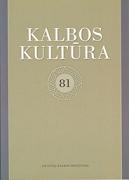Valstybių gyventojų pavadinimai ir tatutovardžiai
Words referring to nationals of countries and nations
Author(s): Danutė LiutkevičienėSubject(s): Language and Literature Studies
Published by: Lietuvių Kalbos Institutas
Keywords: Nationals and nations; language standardisation
Summary/Abstract: The paper deals with the words referring to country nationals and nations. It acknowledges two problems: first, the two words are often confused and second, out of the total number of 200 words of the lexical semantic group only about a quarter have been standardised, the remaining words are left at the user’s disposal. The paper attempts to standardise all the above words according to four main principles as identified by the author: – tradition: if the word is found in a dictionary, encyclopaedia etc, it should not be changed, unless there are new facts to consider (e.g. a change in the name of the state leads to changing the name of its nationals, but not its nation). – analogy: if the word is missing in the above sources, it is built by analogy with other firmly established words in the language; thus, if we have perujietis, we can also introduce vanuatietis, if we have kostarikietis, we can introduce sanmarinietis as well-formed words. – systematicity: if the word has no tradition, neither can it be made by analogy, but the rules of word-building still apply, the word is made with the suffix -ietis, -ė. Language users coin new words according to the pattern and usually find it the easiest to apply. – distinctiveness: if the name of the state consists of several words and the process of making a single-word name might result in ambiguities, a national of the state should be then referred to as a national of that state. In any case, words referring to nationals of the country or nations, either in the process of building or changing them, should be treated within a system of language and beyond it.
Journal: Bendrinė kalba (iki 2014 metų – Kalbos kultūra)
- Issue Year: 2008
- Issue No: 81
- Page Range: 80-102
- Page Count: 23
- Language: Lithuanian

